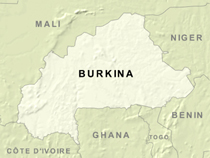2007年VOA标准英语-Surgery Helps Women Recover from Female Genital
搜索关注在线英语听力室公众号:tingroom,领取免费英语资料大礼包。
(单词翻译)
By Naomi SchwarzOuagadougou, Burkina Faso
17 July 2007
Groundbreaking reconstructive surgery for women who have undergone gential mutilation is being performed in Burkina Faso. Despite efforts across Africa to stop the practice of excision1, including an outright2 ban in many countries, it is still widely practiced. From Ouagadougou, Naomi Schwarz tells the story of the surgery and of a woman who has chosen to have it done.
 |
Abi Sanon, now 35 years old, was only a week old when she underwent female circumcision, a traditional practice that has also been called female genital mutilation.
"My mother says I was in a lot of pain and took a long time to heal," she said.
The practice of female genital mutilation, also called excision, has been outlawed3 in many countries, including Burkina Faso, but continues to be widely practiced, often in secret.
"These days many infants are excised5 to try to keep the neighbors from finding out that the procedure has been done," she said.
Many girls die from infections resulting from excision, which is often performed in unsanitary conditions without anesthetic6. Excision can also cause fatal complications during childbirth.
The practice ranges from simply cutting the clitoris to the more drastic removal of the clitoris and labia of the vagina, which is then sewn up to leave a small opening.
Experts say when the practice is done on infants, it is hard to differentiate7 between the different parts of the immature8 vagina, and more can be cut off than was intended.
Efforts to stop the practice have been largely unsuccessful. Alice Behrendt, a researcher with international children's rights organization Plan Internatinal, says Burkina Faso is one of the most advanced countries in the campaign to stop female genital mutilation.
"They have outlawed excision even within [since] 1999 and they are the only country in West Africa who are really enforcing the law," she said.
It is encouraging, she says, but even there, the number of girls being excised has only dropped by a tiny fraction.
Experts who have surveyed the practice say more than three-quarters of women in Burkina Faso have been excised. In other countries, such as Guinea, they say, the number is close to 100 percent.
In many societies where excision is practiced, people believe the clitoris is impure9, and an unexcised woman will bring problems to her family, husband or village. They believe unexcised women will be unfaithful. Some also believe the practice is required by Islam, although Islamic scholars say this is untrue.
Sanon was a teenager when she met unexcised women for the first time.
"I learned that, for them sex was pleasurable, whereas for me it was mostly painful," she said.
She began looking for a way to repair what had been done to her.
Last year, she finally found her answer. Doctors in Burkina Faso began performing surgery to reconstruct the clitoris.
Gynecological surgeon Michel Akotionga, department chief at the main hospital in Burkina Faso's capital, says most of the clitoris is actually embedded10 within the body. In female genital mutilation, only the external centimeters are cut off. The surgery exposes the embedded clitoris.
Sanon says her family has been supportive.
"My husband was eager to help me get the surgery. He even helped me pay for it," she said.
The surgery costs the equivalent of about $150 at public hospitals, but can cost upwards11 of $400 at private clinics.
Sanon says her sisters have also been supportive, but so far none have chosen to have the surgery.
Plan International's Alice Behrendt says Sanon is extremely lucky.
"Men are still very afraid of women being unfaithful, and most parents refuse to abstain12 from excision, because they fear their daughters will express sexual desire, and it will bring problems for the family, such as early pregnancy13 to the family," she said.
Benjamine Doamba, a Burkinabe journalist who campaigns against female genital mutilation, says she is not interested in having the surgery.
"My parents thought they were doing something good for me when they excised me, and I do not feel like less of a woman without a clitoris. I have a satisfying sexual life," she said.
Doamba says she supports any woman who chooses to have the surgery. But she says she worries that publicizing the procedure will take the focus away from the campaign to end excision outright, and might have unfortunate side effects.
"I am afraid that families who are unsure whether or not to excise4 their daughters will do it anyway, if they think she can undo14 the excision later with this surgery," she said.
The surgery cannot reverse the effects of excision completely. But Sanon says women should know about it anyway.
"Millions of women in the world are excised, and I know that many of them suffer like I used to," she said.
She says women have a right to be whole.




